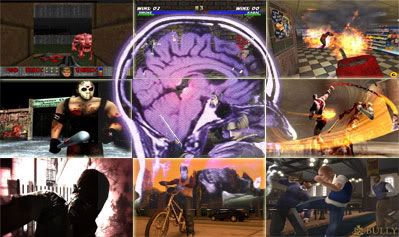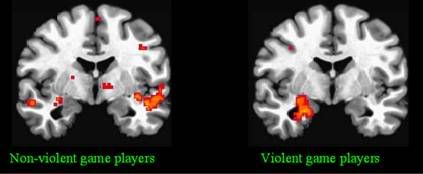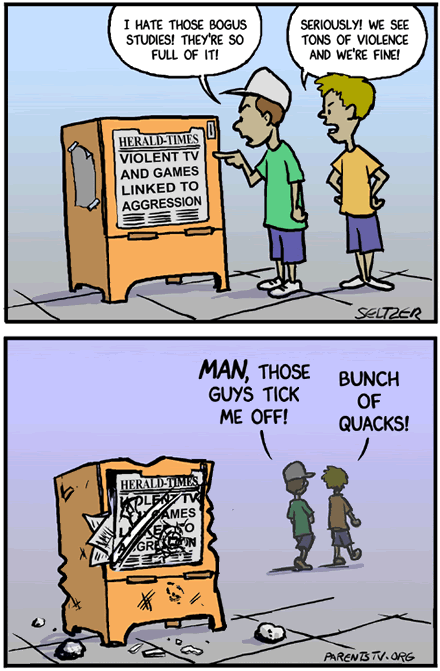First off, thanks to everyone who took the time to read my paper and an even bigger thanks to all those who responded. I was originally planning to reply with a comment here and there, but I've opted to do a follow up post instead since it's much more convenient. Below are a handful of comments that I've replied to.
"I dont like the study study with the brain scans, or the test of punishing their opponent with loud noise. Sure they are valid in the confines of the test, but are they valid or more importantly meaningful after the person has stopped playing for an hour or so. I think you could get the same response from watching a movie, or reading a book.
I know when I was young I would get really hyped up and aggressive after watching wresteling. Im sure my brain scans would have looked just like that. Parents need to judge how their children respond to any form of media."
You bring up a good point and though most of the studies I've referred to in my essay do not delve deeply into how violent video games can drive someone to commit pre-meditated murder, what they do focus on are the effects of short term anger. Most of the murders that occur in America are actually considered crimes of passion, so these studies are actually quite relevant, but they do not prove that video games are the singular or primary cause.
"Think that those agressive gamers might have family probelms.Their father comes back drunk,beats his wife and child and falls asleep.The kid plays video games just like me but when he sees his father doing this there is the snap-he starts harrasing his friends when he is older.The environment that surrounds the gamer is much more important that the games themselves so stop blaming games for violence!!1 Nuff said."
That's actually a dangerous assumption to make. You'd be very surprised at how often relatively normal people get convicted of horrible crimes. That said, again, I do not believe that video games inherently cause people to be violent, but they can become a catalyst given the right circumstances and environment. Having spent a lot of time at internet cafes in the past when games like Counter Strike were much more popular than they are now, I've watched some of my high school peers get into fights over things as trivial as a lucky headshot. Many of them weren't troubled or disturbed either. A lot of what I'm saying right now may seem to contradict my opinion at the end of the essay, but it doesn't. Games don't teach people to kill. That's my stance, but the question of how playing certain games or engaging in certain activities can set normal people off still remains unanswered.
"The research that has been done on violent video games that prove violent tendency after playing violent games is garbage science. In your article it states "Recent findings at the University of Missouri-Columbia have revealed that violent video games can actually trigger a reaction in the brain that causes players to behave more aggressively." In high school, I played on the football team. That was not simulated violence. That WAS violence. It did not cause me to act violent socially. And I started before the age of 16.(debunking the younger mind more susceptible theory) Pro football players, barring OJ Simpson whom is just a psychopath, are no more or less violent outside in their daily lives than other humans. Case closed."
If you read my essay again, you'll notice that I never once said that it was proven. Also, you're misunderstanding the statement I made in my article. The key word is "can." Had I instead written that they (violent video games) DO trigger a violent reaction, you would be right. Also, while you do present a valid argument, you're overlooking a lot of things. Obviously, sports don't cause people to become violent. That is true and the same goes for anything else, but one could argue that the rinkside brawls in hockey offer up an interesting counterpoint. Why is there fighting in hockey? Why did Dennis Rodman kick that camera operator? Why did Shaq react with hostility to the sideline interviewer? Why do massive fights break out at international soccer games? Why would someone kill another person at a little league game? You could say that the people responsible are merely psychopaths, but simple conclusions like that do little to explain anything in depth.
"I laughed at Jack Thompson and his "dendrite theory". Firstly 'cause I know it's impossible, once a neuron (dendrites are part of a neuron) grows to maturity it doesn't fix itself, it's just replaced. And secondly because dendrites are not at all specialized to any kind of brain activity, all they do is accept (receive, not produce) data."
That's correct and I definitely agree with you, but I have one thing to add also. The process of replacing dendrites (pruning) CAN be withstood if the neural pathway has been firmly established. It requires that an experience must be repeated roughly 300 times, though. That much is true, but Jack Thompson takes this out of context and tries to argue that the experience of killing a digital character makes it easier to kill a real life person.
"You introduce all your sources well and all your figures have a good foundation. I also think you can go further with the piece. You state a bunch of statistics, and that is good for beginning a paper, but there is room for it to grow. When you started talking about the school shootings and then boys' friendships being centered around video games, include some of your own opinions. This piece is good, do not misunderstand me, but there are so few of your own thoughts in it that it starts to get stale. I would like to see a follow up piece soon."
The reason I do not voice my thoughts until the conclusion is due to the fact that my professor made it clear that, for the purpose of this analytical paper, I wasn't supposed to. I'm glad you wanted to hear my side of it though and given that this is a small part of what is eventually going to be my master thesis (which is essentially a book), you can be sure that there will be a lot more to it.
"Due to the audience, your paper has garnered quite the positive response. Would that we all were Concerned Parents for Violence Awareness (fictional group) would your paper hold up as well? What was your intended audience? Did you intend to persuade, or was your paper designed to be a biased informational read?
If your aim was to preach to the choir, I believe you did a good job of putting some decent facts together for people to cite and ponder, but if you were trying to convince you might end up short on hard talking points.
All credit to you though for sharing your paper with us. Thanks."
Thank you for the constructive feedback. I've come to learn a lot of things in the recent months since I finished this paper and, looking back on it, there are definitely a lot of areas where I would like to improve. Luckily, as I mentioned earlier, this will be the subject of my master thesis, so the next time around (in approximately two years), I'll be able to cover a lot more. To answer your question, my targeted audience was the average middle-of-the-road parent who's worried about media violence, but skeptical of sensationalist news reports. I didn't want to go for something too heavy handed as I was still in the process of getting my head wrapped around all the facts, research, and everything so I pulled the punches quite a bit.





Log in to comment